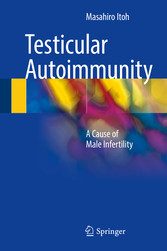Search and Find
Service
Testicular Autoimmunity - A Cause of Male Infertility
This book addresses various aspects of testicular autoimmunity. It has long been suspected that testicular autoimmunity could be one of the causes of idiopathic male infertility. However, it is very difficult to estimate the incidence of testicular autoimmunity in men, as most male patients first realize they are infertile when they start trying to conceive a child, and there is a possibility that their testes may already exhibit the end stage of testicular autoimmunity, in which lymphocytic inflammation and immunoglobulin deposition in their testes subsided long ago and only the spermatogenic disorder remains. Therefore, autopsy or biopsy for testicular tissues in men before the end stage of testicular autoimmunity and investigations using testicular autoimmunity model animals are needed to determine the epidemiology of testicular autoimmunity.
Accordingly, the book discusses 'the immunological fragility of testis' with regard to male infertility, reviewing autopsy data in men and presenting experimental data using murine models of autoimmune orchitis that has been induced by immunizing with viable syngeneic testicular germ cells alone. Testicular autoimmunity in animals is also discussed.
In summary, the book provides a wealth of valuable information, not only for researchers who are interested in immunologic male infertility, but also for clinical professionals who treat these patients at hospitals.
Dr. Masahiro Itoh obtained Ph.D. degree in Division of Medicine, Kagawa University, in 1987. he started his carrier as an assistant professor at Kagawa University, and promoted to full Professor in 2001, at Tokyo Medical University. He is one of the top scientists in Japan and well-known as he succeeded in making new murine models of autoimmune orchitis.
Accordingly, the book discusses 'the immunological fragility of testis' with regard to male infertility, re
All prices incl. VAT












